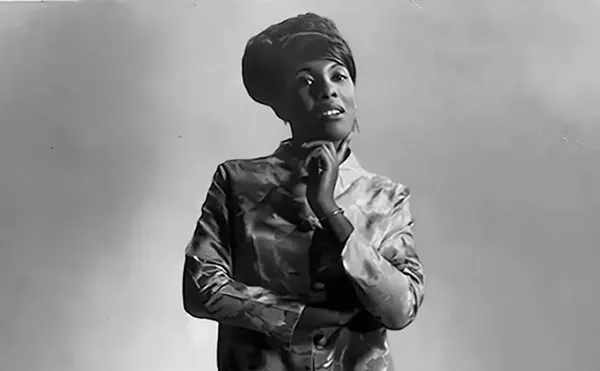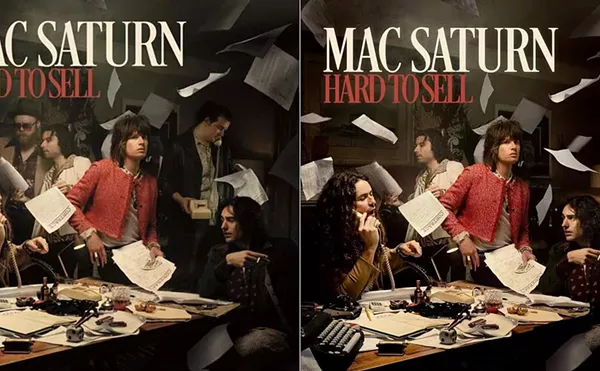
Audio By Carbonatix
[
{
"name": "GPT - Leaderboard - Inline - Content",
"component": "35519556",
"insertPoint": "5th",
"startingPoint": "3",
"requiredCountToDisplay": "3",
"maxInsertions": 100,
"adList": [
{
"adPreset": "LeaderboardInline"
}
]
}
]
Page 4 of 4
On the gospel recordings, Cooke was clearly trying to communicate a different kind of emotional state. His songs are story-songs in the pastoral sense. These are scenes you've just been dropped into. They're not showy or ornate, but they are evocative. One remarkable thing about this song is the manner in which it celebrates a very popular hymn.
At the same time that it's its own new composition about Sarah Fuller Flower (later Sarah Flower Adams)'s infamous "Nearer, My God to Thee" it's a meditation on the way the song has affected the narrator, and the ways that hymns can get the listener over in general.
 Sarah Fuller Flower — say it 10 times fast — had her sister Eliza set the words to music for the original hymn, which is based on the part of Genesis that tells of Jacob's dream, wherein God revealed to Jacob the full glories of heaven despite the fact that where Jacob was at the time was anything but, by placing a ladder for him that reached on up to heaven. Sarah Fuller Flower herself wrote the hymn after waking from a dream.
Sarah Fuller Flower — say it 10 times fast — had her sister Eliza set the words to music for the original hymn, which is based on the part of Genesis that tells of Jacob's dream, wherein God revealed to Jacob the full glories of heaven despite the fact that where Jacob was at the time was anything but, by placing a ladder for him that reached on up to heaven. Sarah Fuller Flower herself wrote the hymn after waking from a dream.
She died at the age of 43 in 1848; both sisters passed away from consumption, TB. "Nearer My God To Thee" would not nearly be as well known today were it not for the hymn's association with the Titanic — the band played on as the ship sank, cycling through this number, until they couldn't. McKinley is said to have quoted the hymn on his deathbed, while the thing's been played at numerous Presidential funerals since then too.
The reason this song is based on the hymn "Nearer My God to Thee" is simple; it was Cooke's mom Annie Mae's favorite song. The emotional core of the song tells of Cooke wondering what his mother is doing when she retreats to be by herself, so he follows her to find her on her knees singing the hymn, alone. Cooke had been raised with a forward-thinking, black pride consciousness; he was taught to think for himself and not back down. In the many Sam Cooke family myths, there's one where a group of bullies harassed him on the way to school every day, until finally he wore them out with his sheer persistence; they grew tired of him. Much of this, he got from his mother who herself grew up in a short-lived experimental all-black community in the South at the start of the last century.
But, she was also his mom and stuff, so of course he wrote a gospel song about her! The Five Blind Boys of Alabama alone wrote so many mother-themed songs that when Lee Breuer put his 1985 musical Gospel at Colonus together — a gospel version of Sophocles' tragedy — in a genius stroke, those dudes were collectively cast to portray Oedipus.
The first two verses of Cooke's "Nearer" set up a very old-time-religion sweet little scene: "The minister was preaching/ and the crowd was standing near/ The congregation was singing a tune/ in a voice that was loud and clear/ You know the crowd stood around him/ they were crying, I could plainly see/ For the song that they sang was touching/ they were singing: Nearer my God to thee." Then the entire group busts into the hymn.
And just when you think this is maybe all too much, that it's too Hallmark for Hallmark, Cooke blindsides you with the following verse "Sometimes I like to be in company/ And then again I like to steal off all alone/ Song is the only thing, Father, that will console me, Lord/ when I know trouble is about to come," which is just realer-than-real levels of vulnerability. And the real kicker is this following verse which adds to the analytical deep thoughts vibe beautifully; "Songs have a feeling/ There is a story in every song we sing/ Songs that are known to lift heavy burdens/ If all of our troubles, to God we oughta bring." It looks clunky written down, but it's not at all when he croons the fuck out of the thing.
The fallout from the Shrine Concert itself was almost instant. The Caravans' pianist and arranger James Cleveland soon moved out to L.A. in order to create that big booming contemporary mass choir sound that's dominated gospel for much of the last 50 years. Bumps Blackwell had been fully blown away by the Shrine Concert; his immediate reaction to Cooke's performance was that he had to get him to play pop music. A few weeks after this show, Blackwell flew to New Orleans to cut the first Little Richard sides for Specialty. This helped to give him more cachet with the company. So, when he had time, Bumps followed Cooke around the country over the course of the next 18 months trying to convince him to go pop and record with him until he finally did. Cooke was enamored with the city, and moved there soon as well.
Other modern gospel songs are essentially new gospel numbers forged from older hymns with commentary about the hymn, but it's hard to top what Cooke does here with "Nearer." In the late '60s, after Claude Jeter had left the Swan Silvertones, they did something similar in a live recording: their own meta-hymn take on "Amazing Grace," with former Dixie Hummingbirds singer Paul Owens on lead. As the rest of the band sings a sweet and keyed-up version of that infamous hymn written by a slave trader during an Atlantic crossing, this song that's been called America's spiritual anthem, Owens also tells of how his mother would steal off on her own to sing this song.
There is a story in every song that we sing. Songs do have a feeling, and, thankfully, they are still known to lift heavy burdens.
Let's hear this transcendent one again, right now.
At the same time that it's its own new composition about Sarah Fuller Flower (later Sarah Flower Adams)'s infamous "Nearer, My God to Thee" it's a meditation on the way the song has affected the narrator, and the ways that hymns can get the listener over in general.

Sketch of Sarah Fuller Flower Adams, after an 1834 sketch by Margaret Gillies. From Wikipedia.
She died at the age of 43 in 1848; both sisters passed away from consumption, TB. "Nearer My God To Thee" would not nearly be as well known today were it not for the hymn's association with the Titanic — the band played on as the ship sank, cycling through this number, until they couldn't. McKinley is said to have quoted the hymn on his deathbed, while the thing's been played at numerous Presidential funerals since then too.
The reason this song is based on the hymn "Nearer My God to Thee" is simple; it was Cooke's mom Annie Mae's favorite song. The emotional core of the song tells of Cooke wondering what his mother is doing when she retreats to be by herself, so he follows her to find her on her knees singing the hymn, alone. Cooke had been raised with a forward-thinking, black pride consciousness; he was taught to think for himself and not back down. In the many Sam Cooke family myths, there's one where a group of bullies harassed him on the way to school every day, until finally he wore them out with his sheer persistence; they grew tired of him. Much of this, he got from his mother who herself grew up in a short-lived experimental all-black community in the South at the start of the last century.
But, she was also his mom and stuff, so of course he wrote a gospel song about her! The Five Blind Boys of Alabama alone wrote so many mother-themed songs that when Lee Breuer put his 1985 musical Gospel at Colonus together — a gospel version of Sophocles' tragedy — in a genius stroke, those dudes were collectively cast to portray Oedipus.
The first two verses of Cooke's "Nearer" set up a very old-time-religion sweet little scene: "The minister was preaching/ and the crowd was standing near/ The congregation was singing a tune/ in a voice that was loud and clear/ You know the crowd stood around him/ they were crying, I could plainly see/ For the song that they sang was touching/ they were singing: Nearer my God to thee." Then the entire group busts into the hymn.
And just when you think this is maybe all too much, that it's too Hallmark for Hallmark, Cooke blindsides you with the following verse "Sometimes I like to be in company/ And then again I like to steal off all alone/ Song is the only thing, Father, that will console me, Lord/ when I know trouble is about to come," which is just realer-than-real levels of vulnerability. And the real kicker is this following verse which adds to the analytical deep thoughts vibe beautifully; "Songs have a feeling/ There is a story in every song we sing/ Songs that are known to lift heavy burdens/ If all of our troubles, to God we oughta bring." It looks clunky written down, but it's not at all when he croons the fuck out of the thing.
The fallout from the Shrine Concert itself was almost instant. The Caravans' pianist and arranger James Cleveland soon moved out to L.A. in order to create that big booming contemporary mass choir sound that's dominated gospel for much of the last 50 years. Bumps Blackwell had been fully blown away by the Shrine Concert; his immediate reaction to Cooke's performance was that he had to get him to play pop music. A few weeks after this show, Blackwell flew to New Orleans to cut the first Little Richard sides for Specialty. This helped to give him more cachet with the company. So, when he had time, Bumps followed Cooke around the country over the course of the next 18 months trying to convince him to go pop and record with him until he finally did. Cooke was enamored with the city, and moved there soon as well.
Other modern gospel songs are essentially new gospel numbers forged from older hymns with commentary about the hymn, but it's hard to top what Cooke does here with "Nearer." In the late '60s, after Claude Jeter had left the Swan Silvertones, they did something similar in a live recording: their own meta-hymn take on "Amazing Grace," with former Dixie Hummingbirds singer Paul Owens on lead. As the rest of the band sings a sweet and keyed-up version of that infamous hymn written by a slave trader during an Atlantic crossing, this song that's been called America's spiritual anthem, Owens also tells of how his mother would steal off on her own to sing this song.
There is a story in every song that we sing. Songs do have a feeling, and, thankfully, they are still known to lift heavy burdens.
Let's hear this transcendent one again, right now.






